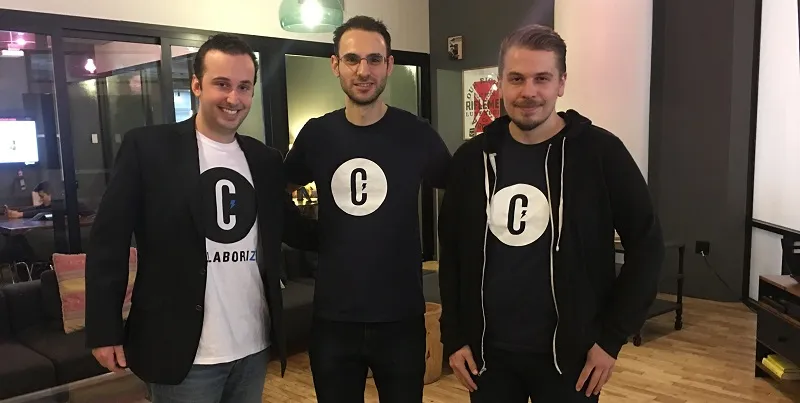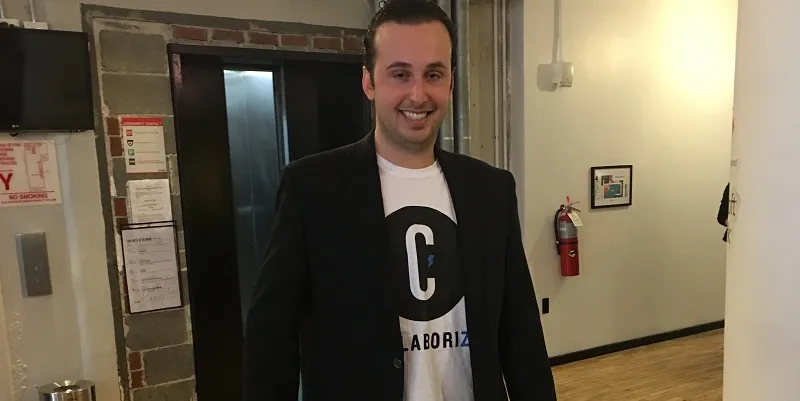Freelancing and collaboration is the future of work: Collaborizm founder
Collaboration was the objective of Globalisation 2.0. But thanks to skewed tax systems, trade protectionism, currency manipulation and nations looking inward globalisation has taken a hit. However, thanks to the Internet, Collaborizm, born out of University of Miami, has been able to make 1,15,000 engineers connect with each other globally to engineer solutions. Steven Reubenstone, the founder, says knowledge-sharing globally should not go away because it is what inspires creativity and problem-solving. There are maker websites and fund raising platforms like GoFundme, Maker Shed and Makerzine that connect ideas globally. But Collaborizm works on a unique business model, where solutions are built for companies and the engineers get paid for their freelance work.
With more than 75,000 Indian engineers solving world problems, Steven explains how Collaborizm works for them. Excerpts of an interview with the founder, who is known to mess around with robotics/IoT ideas when he finds the time:

YS. What is Collaborizm, and how different is it from other co-working spaces, collaboration tools and platforms?
SR: Collaborizm is an online collaboration community and tech incubator that enables aspiring entrepreneurs, engineers, and creatives to form teams and experiment with ideas, virtually. It allows users to immediately start or join a project, form teams and commence working with like-minded people, globally. It is also a social network where highly-skilled users can share knowledge, inspire each other and display their talents.
The activity on the platform is remarkable. We have over 1,15,000 entrepreneurs and engineers collaborating, on everything from Android apps, mobile robots, video games, to film documentaries. This is not a show-and-tell maker platform; this is a place where skilled people collaborate on their passion projects. The platform also provides another unique benefit - because we “default to public” (open source) - the community acts as an extra teammate, providing mentorship to Collaborizm teams.
Let me illustrate this with an example. Nepal’s Light, a solar-powered-portable-charger-plus-flashlight redesigned on Collaborizm by Madindra Aryal, a young Nepali engineer, who built it to help his neighbours ravaged by the devastating 2015 Nepali quake, illustrates the potential of the platform. Madindra used Collaborizm to find virtual teammates globally to work with him on improving his prototype, and he successfully upgraded and distributed it to his community, where it is improving the quality of life of his neighbours. I can’t think of another platform having such a profound positive impact on the lives of their users.
YS: How did you conceive this idea, and what are you solving?
SR: As a mechanical engineering student at University of Miami, Florida, I often had entrepreneurial ideas I wanted to explore. It was frustrating to sit with the same 10 ME students day after day, not to mention the rest of the campus and city of Miami. This made me realise that the big opportunity was creating a platform for creators and inventors enabling them to bridge these 'collaborative silos' and also provide a playground to explore the potential of ideas with new team mates. This was the seed inception of Collaborizm.
YS: You seem to have a strong India connect?
SR: The reason why 75 percent of Collaborizm’s 115,000 users are in India is because it is where the greatest pain point exists. Software and engineering students and recent grads are desperate to share knowledge and gain experience, find new cool projects to work on, and enhance their credentials. There is a much higher density of engineering/maker talent in India and developing markets. So it’s not surprising that our early adopters are from these regions.
We do not yet have a physical space in India but plan to set up an office soon. We’ve seen interest from makers groups in India and we are exploring partnerships with physical Makerspaces in India. For example, we recently launched a joint venture with a New Delhi-based Makerspace called Banaao, which will allow active participants on Collaborizm receive discounts on joining Banaao and using tools in the Banaao space. One of the founders of Banaao is even building a project on Collaborizm--a chocolate 3D printer.
YS: Talk about your business model or revenue models in detail, and how your unit economics work out in the co-working space?
SR: Collaborizm is not a co-working space. We are an online collaboration community and tech incubator enabling aspiring developing markets entrepreneurs and innovators to build their ideas with like-minded teammates.
We have two businesses - our freelance marketplace and hosting virtual hackathons. We allow our top user to perform freelance work for our customers, and we take a cut of the transaction. We also make money by hosting virtual hackathons for companies interested in introducing our software developers to their technologies.
Our primary competitors are show-and-tell maker websites that allow people who have already built projects to describe by step-by-step tutorials how to build things that have already been built. There is no collaboration or development of new ideas. There are many platforms that have a similar tutorial model. Other websites that could also be considered competitors are platforms focussed on connecting and sharing creative content under one skill umbrella, like CAD file sharing. Collaborizm focusses on connecting individuals across skill boundaries. Artistes to engineers. engineers to entrepreneurs etc.
Collaborizm is focused on active contribution and development of ideas with other people. We are a virtual incubator for emerging market entrepreneurs to connect, and create ideas in the early stages, and find early-stage funding all in one place. None of our competitors focus on idea creation and collaboration. They are purely sharing-based platforms.
YS: What is the opportunity to expand globally for Collaborizm? How do you see this idea kick off in different countries ?
SR: The opportunity to expand is always proportionate to the size of the market with the pain point a company solves. We strongly believe the market opportunity globally is massive for two key reasons:
Skilled developing markets millennials are desperate to find hands on experience to build their resumes to help them find good jobs; and the West is desperate for technology talent.
We believe we are sitting in the middle of one of the biggest market opportunities of the next decade, which is the shift to freelance work. With the largest tech talent surplus coming from developing markets, and the largest deficit in countries in the West, Collaborizm can become a bridge connecting independent tech talent to the demand in the West. The fact that companies in developed markets are increasingly turning to independent contractors to supplement their permanent workforce will serve to accelerate the demand for the skilled talent on our platform.
YS: Why should a startup or business use Collaborizm?
SR: Collaborizm is an incubator for early-stage entrepreneurs. We provide them with all the tools they need to quickly launch their idea, find like-minded teammates and to advance their projects together. We also provide a community with a shared vision to share knowledge, help and inspire each other.
For businesses we bring low-cost, high-quality tech talent. Our users are focussed on displaying their talent and earning credentials, so they are willing to provide their services at extremely competitive freelance rates. The ability to tap into our community’s global mind as a resource as you work with our tech talent pool is a massive value proposition to businesses with limited tech experience.
YS: Talk about your growth. Have you raised any funding?
SR: We started with a few hundred users exploring ideas in the summer of 2016, when we launched. Today, we have over 115,000 users from over 40 different countries; the community is exceptionally active.
Growth has started to dramatically accelerate as we’ve improved incentives. We have launched the Collaborizm Innovator Fund, and as we have added better resume building tools. We raised $600,000 in 2015, which I have used for hiring my team and building the platform. We just opened a new round of funding to automate our freelance business and to otherwise scale the venture. We are looking for investors in emerging markets, like India, who can provide mentorship as well as capital.

YS: What is your goal and objective in business strategy for the next three years?
SR: The tasks are to grow core tools for creators and grow a diverse skilled community, globally -- making Collaborizm the leading early-stage incubator for makers and entrepreneurs. We also need to grow our freelance marketplace into a global hub for both large and small technical freelance gigs. We want to remain highly focussed in these two areas.
YS: Talk about some interesting ideas that emerged on your platform?
SR: There was a CoffeeBot, where a project leader John Rodrigues, a 22-year old engineering grad from Mangaluru, India, successfully formed a team and prototyped his dream invention, a Coffee Delivery Robot. John is now being mentored on how to create a business from his device, and he has raised money from sponsors and received an investment from the Collaborizm Innovator Fund. Shalini Sundari, an engineering student, received an investment on Collaborizm to build her dream app, The Kidrino, an Internet of Things learning application for Android. She is working with freelancer Ranjan Dailata to build the product. There are several such examples, and India has a lot of ideas, with freelancing being the future of work.
Website: Collaborizm







